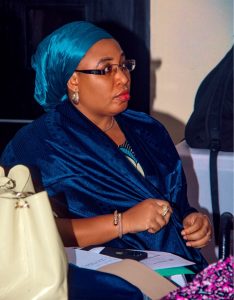National Learning Event
 WFWI in Collaboration with WILPF Nigeria supported by SAFERWORLD organized a one day learning and outcome harvesting event for Women’s Rights Organizations in FCT Abuja on the 22nd of February 2022. The primary objective was harvesting outcome from interventions of the WROs over the past five (5) months period (September- January).
WFWI in Collaboration with WILPF Nigeria supported by SAFERWORLD organized a one day learning and outcome harvesting event for Women’s Rights Organizations in FCT Abuja on the 22nd of February 2022. The primary objective was harvesting outcome from interventions of the WROs over the past five (5) months period (September- January).
Objective
The objectives of the meeting are:
- The event will serve as learning spaces for WROs to share lessons, establish relationships and work towards common goals, visions and approaches that will enable participants strengthen their work individually and as a movement beyond the lifespan of the project;
- Help WROs and Resourcing Change Consortium partners to identify, document and substantiate good practices, benefits and outcomes related to supporting WROs through flexible funding models that can inform evidence-based advocacy with donors and international Non-Governmental Organizations.
This report covers the one-day learning event with WROs implementing on the FCDO project in the southern and northern region of Nigerian.
Introduction
The meeting commenced with the program officer of WILPF Nigeria Jane Siesi who gave an overview of the meeting. She spoke on the need to evaluate the implementation and outcome of the project, harvest stories of change, lessons learned, and how the lessons learned will be utilized. She made reference to the impact of the project which (a) strengthen the institutional capacity of the people and; (b)To strengthen their work on GBV prevention, or other thematic areas for interventions to be carried out. This she stated that the funding was informed as a result of the mapping done in 2020 by WILPF Nigeria which part of the recommendations given was to fund WROs with flexible funding hence lessons from the learning event can also provide such avenues.
She further spoke on the use of the 5Ws (What, Why, Who, When and Where) to evaluate the progress made in the past five (5) months of the project on interventions carried out by the WROs. She stressed on the importance of the learning event which was to serve as a guide to both the funders, partners and the sub grantees in identifying the changes that have taken place as a result of the WROs intervention on the project, key lessons and recommendations which will also form policy documents for advocacy and later upscaled to funders to guide their decisions for further funding. She implored open-mindedness and honesty in responses from the participants as a key strategy of harvesting outcomes from their activities on the project.
Outcome Harvesting
The Advocacy Coordinator WFWI Ms. Zainab Gbobaniyiled this session, explaining the outcome harvesting processes as an evaluation approach in which evaluators, grant makers, and/or Programme managers and staff identify, formulate, verify, analyze
Further to the presentations by the representatives of the partner organisations, there was a breakout session where the participants were split into three (3) working groups based on the thematic area they are working on (Economic Empowerment, Gender Based Violence prevention and response, and Conflict resolution and Peace building). Each Group responded to the question: “What behavioral changes have they noticed in their communities? And some examples of outcomes.”
Overview of Feminist Principles and Approaches
The session was taken by the Country Director of WILPF Nigeria Prof Joy Onyesoh who spoke on Feminist Principles and Approaches. She started by giving the background to the session which was to guide WROs in responding to the group work session on feminist approaches and principles. Prof Joy started with an overview on feminism and feminist approach. She described feminist approach as seeking to address root causes of structural inequalities and transform systems of power. Describing Feminist Principles, she spoke on feminist principles being aspirational, describing ways of working that prioritize power, participation, collaboration, contextualization, reflexivity, inclusivity and responsiveness. She concluded the session by listing and explaining some feminist principles which brought her session to an end.
Following the presentation of the country Director of WILPF Nigeria, the WROs engaged in group work section which upon presentation brought the meeting to an end by 6:30pm.


ENUGU (Head Office)
- D9 C to C plaza, 8 presidential Avenue Independence Layout
- Office +2348034141189
- info@wilpfnigeria.com
- 8:00am-6:00pm Mondays to Fridays
ABUJA
- 44 Ebitu Ukiwe Street, Jabi, Busy Mart Plaza, 3rd floor flat 3. Abuja
- Office +2348148851184
- info@wilpfnigeria.com
- 8:00am-6:00pm Mondays to Fridays
- WILPF Nigeria - Copyright 2020

